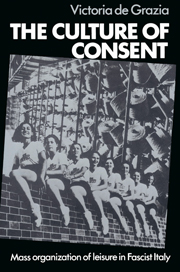Book contents
- Frontmatter
- Contents
- Preface
- 1 The organization of consent
- 2 The politics of after-work
- 3 Taylorizing worker leisure
- 4 The penetration of the countryside
- 5 Privileging the clerks
- 6 The nationalization of the public
- 7 The formation of fascist low culture
- 8 The limits of consent
- Abbreviations
- Notes
- Bibliography
- Index
8 - The limits of consent
Published online by Cambridge University Press: 18 December 2009
- Frontmatter
- Contents
- Preface
- 1 The organization of consent
- 2 The politics of after-work
- 3 Taylorizing worker leisure
- 4 The penetration of the countryside
- 5 Privileging the clerks
- 6 The nationalization of the public
- 7 The formation of fascist low culture
- 8 The limits of consent
- Abbreviations
- Notes
- Bibliography
- Index
Summary
Consent is as unstable as the sand formations on the edge of the sea.
B. MussoliniThe years between the close of the Ethiopian campaign and the outbreak of World War II present us with a series of seeming paradoxes. The period began with Mussolini apparently at the peak of his popularity, having just vindicated Italy's “proletarian” and “Roman” right to African colonies over the opposition of the “plutocratic” liberal democracies. Yet hardly a year later, the “exaggerated psychological exaltation” Morandi and other antifascists had observed during the seven-month campaign had degenerated into what police informers characterized as a “strange exhilaration,” manifested not only in crowd rowdiness and rudeness toward fascist officials, but also in calls for a return to the ostensibly democratic dicianovismo of fascism's 1919 program and complaints over the regime's failure to act on any of its repeated promises for social reform. By 1938, university students in the GUF had taken up the revolutionary slogans of the “first hour” and the fascist trade unions, responding to worker protests over inflation, after years of quiescence once again adopted a militant posture, seeking wage increases and recognition for the factory labor delegates. In September 1939, as fascist Italy's Nazi ally invaded Poland, public opinion, when not described as “discontent,” was generally interpreted as “unresponsive,” above all to the regime's militaristic bombast.
- Type
- Chapter
- Information
- The Culture of ConsentMass Organisation of Leisure in Fascist Italy, pp. 225 - 244Publisher: Cambridge University PressPrint publication year: 1981



